The Ragwitch Read online
Page 17
Julia stiffened at her words, and broke free from Anhyvar’s embrace. But Anhyvar said quickly, “Oh, I mean we are like two different parts of the same person. I am the good part, and she is wholly evil, and far more powerful—even now that I am no longer sleeping. But let us quell these flames…and…let us go to Mirran.”
Despite his good intentions, Paul had collapsed from shock and exhaustion before he’d made it to Caer Follyn. The uncomplaining Quigin had hoisted Paul up across his shoulders and carried him the last few hundred meters, up the hill, through the bailey of the castle (now the camping ground for the fisherfolk of Donbreye) and round and round a circling stair to a soft feather bed in one of the towers, just below the friendly owls.
There, eight hours later, Paul woke up with the unpleasant feeling of not knowing where he was. It was dark, too, but as the sleep cleared from his eyes, he saw there was a lit candle by the door. In the dim pool of golden candlelight, he saw the glint of armor, and heard the soft thk-thk of a sword being burnished.
As his eyes totally cleared, he followed the burnisher’s arm from the light up to a face in the shadows—and a familiar voice said, “Can you say Awgaer yet, Paul?”
“Aleyne!” cried Paul happily, sitting up in his bed like a jack-in-the-box. “What are you doing here?”
“Looking for you,” replied Aleyne drily. “What else would I be doing?”
“Were you really looking for me?” asked Paul. He thought that would be unlikely—he didn’t feel important enough to have someone like Aleyne looking for him. Then he remembered the Breath and the Blood. They were important…but then, Aleyne couldn’t have known about them…
“Yes,” replied Aleyne, breaking into Paul’s rather sleepy train of thought. “I was looking for you. When I spoke to Maghaul at Rhysamarn, she…”
“Maghaul? Not Tanboule?” interrupted Paul.
“The Wise are many, and Rhysamarn is a big mountain,” replied Aleyne. “Though I’ve heard tell that they are all different parts of just the one. Anyway, I spoke to Maghaul, and was told to warn the King, and then to find you—and to look on the eastern coast. So I rode like a dervish to Yendre, raising the hue and cry as I went. Yet when I arrived at the Citadel, the news had gone before me. Messenger birds had flown from Caer Calbore, telling of a great murder at Bevallan, and a battle at the Namyr Gorge, where a company of borderers and some sort of Wizard tried to hold Her at the Steps. So the King had already called the folk to war, and the muster tokens had gone forth.”
“The Storm Boy…” muttered Paul, thinking back to the fish-stinking hut, and Deamus’s explanations.
“Yes. The Storm Boy is such a token. In fact, I was bringing that one myself. I have carried such tokens to several of the coast villages over the last two days. It seemed sensible, since I had to come this way in search of you. Then, this morning as my company and I rode north, we had the good fortune to rescue the folk of Donbreye from a band of Gwarulch.”
“But not everyone, and not Sir Rellen,” said Paul sadly.
“No,” answered Aleyne, looking down to the sword he burnished, and blowing gently, his breath fogging the steel. “He fell earlier, trying to hold the Gwarulch in the village—he helped many of the fisherfolk to escape. He was a famous Knight, and friend of the present King’s father. He fought on the borders for many years to keep such folk as those of Donbreye safe—whatever he was facing, be it fire, flood or foes. I hope that I will look after the people of the Awgaer as well as Sir Rellen, who watched the coast.”
He again looked up from his sword, and said, “Now you must rest again, Paul. There will be many things to do, come the morning.”
“Yes,” answered Paul, quietly. “I’m glad you found me.”
“I’m glad too,” said Aleyne. “Though you do seem to attract a great deal of trouble.”
“I don’t mean to,” replied Paul. Somewhere above his head, an owl let out a melancholy hoot, and he added sleepily, “Have you met my friends Quigin and Sevaun?”
“Yes,” laughed Aleyne. “In fact, I think that was Quigin hooting. And I’ve met Deamus and Oel as well. Everyone has told me a great deal about what you’ve been doing.”
“I’ll tell you again, tomorrow,” mumbled Paul. “Most of it was horrible…and tiring…”
“Goodnight,” said Aleyne. He reached over to snuff out the candle, but saw that Paul was already asleep, so he picked up his scouring cloth again and turned his attention to the blade across his knees. There had been Meepers above the tower earlier in the night, watching for any lone sentry that might fall asleep, or perhaps a chance to get at Paul—for Aleyne was certain they were after the boy. And the Gwarulch hadn’t retreated far, and were bound to be slinking back under the cover of darkness.
The morning seemed to dawn immediately after his conversation with Aleyne, and Paul awoke with the expectation that it had all been a dream. But there was Aleyne, half asleep on the stool by the door, his sword by his side. He raised his head as Paul got out of bed, and said, “Good morning! Are you ready for a hard day’s travelling?”
“Travelling?” asked Paul, half-heartedly. He felt like curling up in front of a fire all day, steaming the water out of his bones. After all, he had been underwater for almost a whole day!
He was just about to voice these protests, when Aleyne smiled, and said, “Because if you do feel like travelling, forget it! The muster won’t be complete for a day at least. Then we travel.”
“Where to?” asked Paul. “I have to find the Earth Lady or the Fire Queen.”
“They may be found upon our path, I hope,” said Aleyne. “At least as well as anywhere else. And it is certainly no longer safe for you to be travelling alone, or in a small group. It is too much of a coincidence that the Gwarulch attacked Donbreye so soon after your arrival—for there are many villages farther north that are still untouched.”
“You mean She sent them to get me?” asked Paul. “They know where I am?”
“Perhaps,” answered Aleyne, then, seeing Paul’s dismay, added, “but you are quite safe here. I have a company of Borderors with me—they’ve often fought Gwarulch on the northern border. And there are a lot of villagers—as well as the hardy fighters of Donbreye.”
“Oh well,” said Paul, nervously checking his pouch to make sure the Breath and the Blood were safe. “I don’t know what else I could do. And the Wise did tell you to look for me, so it must be the best thing to do. Where are we going?”
“Why, to join the King’s army, of course,” replied Aleyne. “I thought I told you…the King is marching north to relieve the siege of Caer Calbore, which has been holding out against the Ragwitch and Her horde of North-Creatures.”
“Are you sure that’s the best thing to do?” asked Paul, thinking that a horde of North-Creatures sounded worse than anything—and to actually go towards Her and a horde…
“I am sure it will be…” replied Aleyne. But secretly, he wondered. He’d read a little about the North-Queen while he’d been in Yendre. She had defeated all the Kingdom once—a Kingdom that was far more warlike and prepared than at present. Now that She had come again in the form of the Ragwitch, marching to do battle with Her might be the most dangerous thing anyone could do. But the Wise had told the King to give battle…and to find Paul. Aleyne hoped this wasn’t one of the rare times that the Wise were hopelessly wrong.
Two hundred kilometers to the north of Caer Follyn, Caer Calbore’s defenders were hard pressed. Already the inner and outer baileys had fallen—no wall or gate could stand against the Angarling, and where they smashed an opening, the Gwarulch and Glazed-Folk followed. Now, only the Great Keep still held out, and the Gwarulch were filling the ditch before it with logs and stones, bodies and earth, to make a causeway for the Angarling to cross and break the gate. Standing high on the wreckage of Caer Calbore’s outer walls, the Ragwitch watched Her servants work.
When the causeway was complete, She raised one hand to signal the attack—and then suddenly, S
he swayed, with Her fat, three-fingered hand clasped to the side of Her head. Around Her, the Angarling let out a great boom of noise, their deep-carved faces screwed up in mortal pain. Then the Ragwitch screamed, a scream of rage and hate that shattered the broken stones before Her, and sprayed the backs of the attacking Gwarulch with lethal splinters. She screamed on and on, and the rock splinters flew with deadly purpose among the ranks of the Gwarulch, who howled and ran aside, abandoning the attack. Only the Glazed-Folk kept throwing themselves forward, cackling and screaming—to be feathered with arrows, or pushed back from the ramparts, their ladders breaking on the rocks below the keep.
Within a minute of Her scream, a tide of Gwarulch flowed away from their Mistress as She stood among the troubled Angarling, oblivious to the battle before Her. Only Oroch moved against the tide, the Gwarulch parting before him, despite their haste to slip away from Her awful scream.
When Oroch finally reached Her, the Ragwitch fell silent. He bowed, and squeaked fearfully, “What ails you, Mistress?”
The Ragwitch didn’t look at him, but Her mouth moved slightly, and Oroch thought he heard a voice long forgotten—the voice of a human Witch, in the times before either She or Oroch himself had entered the service of evil. And that voice said, soft in anguish, “So much pain…”
Then the Ragwitch looked at him, and She bared Her mouth still more, showing her shark-teeth in anger. “Why is the attack slowing?” She hissed, raising one puffy arm. “Why do the Gwarulch slink away?”
“You…you screamed,” began Oroch, but She cuffed him to the ground, spittle blowing as She spat, “Bring them back. I will lead the next attack Myself!”
She watched his black-bandaged form scamper across the rubble to the Gwarulch chieftains, and wondered at the feelings that had so briefly tormented Her, feelings from the past She thought she had buried completely in the service of evil and the Nameless Realm. For a moment, She wondered if the girl had something to do with it. But Julia was there, tied to Her senses, silently watching the battle, and slowly fading into the Ragwitch’s grim mind.
Casting Her thoughts back to the attack, the Ragwitch raised an arm, and a black fog drifted from Her hand. Twirling it like a rope, She flicked it at a nearby Gwarulch. He yelped once, and slowly fell to the ground, life ebbing till he was no more than a windblown husk. Satisfied, She curled the fog back into Her hand in readiness, and, fixing Her gaze on the main gate of the keep, lumbered forward, the Angarling forming their protective ring around Her.
Watching through Her eyes, the twig-maid shook and shivered. She was already crumbling, becoming less of Julia, and more of a flame and rowan. Soon the Ragwitch might discover the true nature of the twig-maid, and then…She would look deep inside Herself for Julia.
As the Ragwitch screamed and the Gwarulch and Glazed-Folk attack on the castle faltered, the Castellan of Caer Calbore wearily made his way up the long stairs of the highest tower at the southern corner of the Keep. Atop this tower, the castle’s Friend of Beasts spoke to his swiftest falcon, and the Castellan hurriedly scrawled the message she would carry.
“Send the falcon when the upper gate falls,” he said to the Friend of Beasts. “I hope she can outfly the Meepers.”
“She is sure of it,” said the Friend of Beasts, but the Castellan was already clanking back down the stairs, to prepare for what would certainly be the enemy’s last and successful attack. The Friend of Beasts watched the Castellan’s blood-streaked helmet disappear around the corner, then read the message before he tied it on. It said only, “Caer Calbore has fallen to the Ragwitch.”
Down below, he heard the hunting howls of the Gwarulch start again, and the thunder of Angarling against the gate—then the dreadful screaming of metal and wood, as the great steel-bound doors gave way, and the howling changed to a note of triumph above the clash and screech of weapons and the fading shouts of the defenders.
He gazed deep into the falcon’s eyes, giving her his last instructions—then he threw her into the sky with a flick of his wrist and watched her speed southwards for a moment, before he picked up his sword and started down, down towards the tumult of battle.
16
A Picnic With Lyssa/Master Cagael & Friends
JULIA LOOKED AWAY embarrassed when Mirran greeted Anhyvar but they didn’t fall into each other’s arms as she’d thought they would. Instead it was a formal greeting: Mirran took her hands, and raised them to his lips, and Anhyvar did likewise. Even so, it was obviously more than that, and Julia still felt she shouldn’t be looking. Then they just stood there—Mirran looking at Anhyvar, and she at him—till the wind came up, and Anhyvar’s hair blew across her face, and she had to use both hands to hold it back.
Julia was reminded of Lyssa’s long, silver hair, and the autumn leaf that would call her to them. She quickly checked that it was still in her shirt pocket. It was, so she pulled it out—but as the leaf cleared her pocket, the breeze picked up again, and it was twitched from her fingers and twirled away up into the sky.
Julia watched it go with a startled immobility, and almost cried out for Mirran to try and catch it. But Lyssa had said, “Send it to the wind when you find Anhyvar…” And she had found Anhyvar—and Mirran.
She looked over to them, and saw that they were following the leaf’s path too. Anhyvar turned to Julia, and said, “You are calling the Rowan Lady—Lyssa?”
“Yes,” replied Julia. “At least, I hope I am.”
“She has heard,” said Anhyvar, looking in the direction the leaf had taken. “She will come.”
“How do you…” Julia began to ask, when she realized that Anhyvar must know what was going on inside her own memory, or the one she shared with the Ragwitch—but it was all so confusing.
“Don’t think too much on it,” said Anhyvar, obviously catching Julia’s thought from her puzzled frown. “Consider Her memory as a completely different world which we can travel in for a time. Better still, don’t think on it at all. Especially now, for I think that it is very much time…for us to have a picnic!”
“A picnic?” asked Mirran and Julia together, both in tones of disbelief, Mirran’s deep voice rumbling under Julia’s high one. The wind-swept top of the midden, so recently lit with crackling flames of ice, did not easily inspire thoughts of a picnic.
“Shouldn’t we be doing something?” asked Julia. “I mean the Ragwitch could be doing anything right now…attacking somewhere, I mean…”
She paused as Anhyvar held up her hand and closed her eyes. She concentrated for a few seconds, then opened her eyes again—and stared straight past Julia, as if she were looking at something entirely different. She frowned a little then, and narrowed her eyes as if squinting through frosted glass.
“She is surveying Her latest victory…” she said, in the matter-of-fact tone of someone describing the view from a window, “a castle, recently taken. Meepers are reporting to Her…they speak of Gwarulch raids to the east…oh!”
Her eyes flashed back to Julia, and she stared at her, one hand half raised to her mouth. “Julia, did you know your brother was in this world—in the Kingdom?”
“What!” exclaimed Julia. “Paul? How could he be?”
“I don’t know,” replied Anhyvar. “But in some way he represents a threat to the Ragwitch—or She thinks he does. She has sent Gwarulch and Meepers to seek him out…and slay him.”
“No…” whispered Julia. “Not Paul…he…he wouldn’t have a chance…”
Anhyvar looked out past Julia again, and concentrated. “He has already evaded the Gwarulch twice. And it seems he is now with a strong band of the King’s soldiers in the east. The Meeper speaks of the Gwarulch being driven off. So he is safe for the time being.”
“Oh, please,” exclaimed Julia. “We have to do something soon—I can’t let Her kill Paul!”
“Don’t worry,” said Mirran, catching a look from Anhyvar. “If he is with a strong force he will be safe for quite a time, particularly if it is a long way from Her. And
we shall do something…but we have to wait for the Rowan Lady—for Lyssa—and I think a picnic is a very fine way to while away the wait.”
He proffered an arm to each of them. Anhyvar looped hers through, but Julia still hesitated, till Anhyvar said, “We need Lyssa’s advice—and her power—before we can act. But for now, there is a seedcake, lemon sherbet and a summer afternoon waiting just around the corner.”
“Where?” asked Julia, looking around at the shells, the red earth, and the windswept sea. The wind was blowing so fiercely that, even with the sun shining, it didn’t feel like a summer day.
“This is my memory too,” replied Anhyvar. “Or parts of it are. And I remember a little sandy cove, the bright sun shining, and a wicker basket with a broken catch, all full of pies and cakes, and the lemon sherbet in a crystal bottle stoppered with a silver cork…”
As Anhyvar spoke, black clouds blotted out the sun. Lightning flickered, and thunder roared. Nervously, Julia took Mirran’s arm, and at Anhyvar’s word, they began to descend from the midden.
Then the lightning flashed directly overhead, and Julia blinked. The next step she took was on soft golden sand…the sky above was the bright blue of a glorious summer day, and a positively huge wicker basket sat atop a blue blanket spread out just above the tide marks. Blinking from the lightning and the sudden sunlight, Julia still noticed that the basket only had one catch, and a silver-corked bottle stuck out of one side.
Paul shrugged his shoulders back again, trying to get used to the feel of the buff coat that had been cut down to his size—or somewhere near it, anyway. It was very bulky and awkward, and it made Paul feel like a robot from an old film, because he couldn’t bend his arms properly—though Aleyne did say that it would get better with wear.
He had a steel helmet too, with a three-barred visor that would never stay up when he wanted it to. It was a very heavy and uncomfortable helmet, but even worse was everyone’s insistence that he wear both coat and helmet all the time—because that meant he’d probably need them.

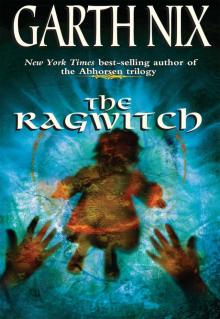 The Ragwitch
The Ragwitch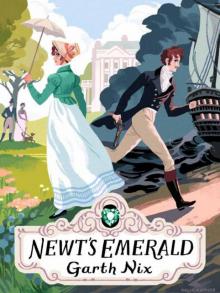 Newt's Emerald
Newt's Emerald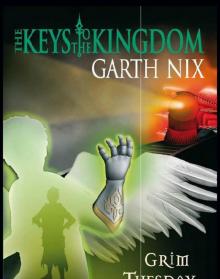 Grim Tuesday
Grim Tuesday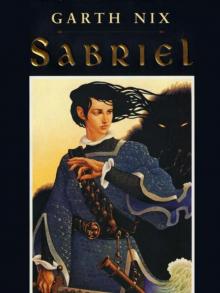 Sabriel
Sabriel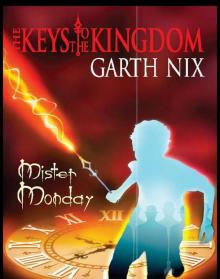 Mister Monday
Mister Monday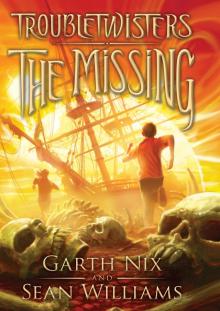 The Missing
The Missing The Fall
The Fall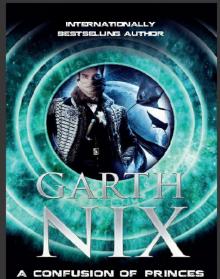 A Confusion of Princes
A Confusion of Princes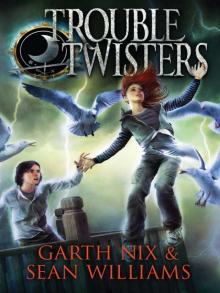 Troubletwisters
Troubletwisters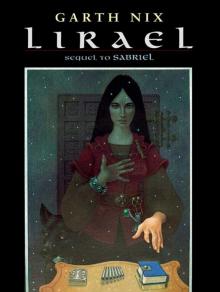 Lirael
Lirael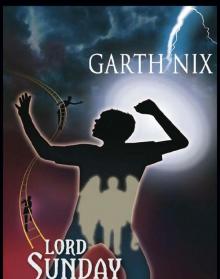 Lord Sunday
Lord Sunday Clariel
Clariel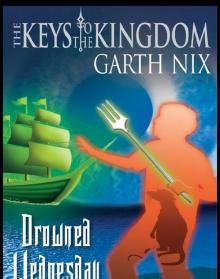 Drowned Wednesday
Drowned Wednesday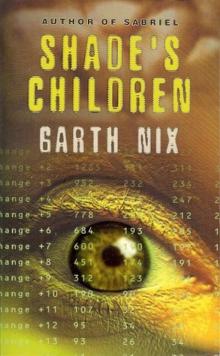 Shade's Children
Shade's Children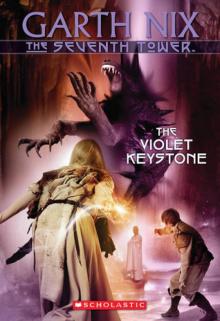 The Violet Keystone
The Violet Keystone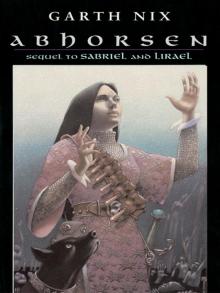 Abhorsen
Abhorsen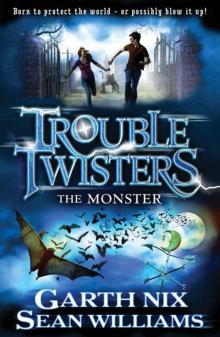 The Monster
The Monster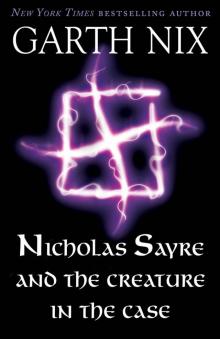 The Creature in the Case
The Creature in the Case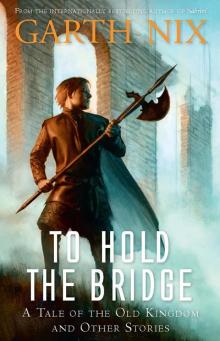 To Hold the Bridge
To Hold the Bridge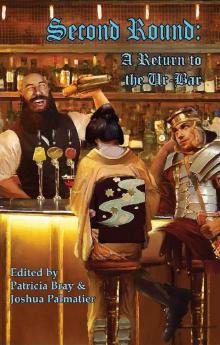 Second Round: A Return to the Ur-Bar
Second Round: A Return to the Ur-Bar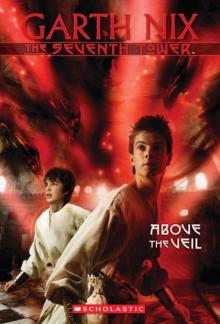 Above the Veil
Above the Veil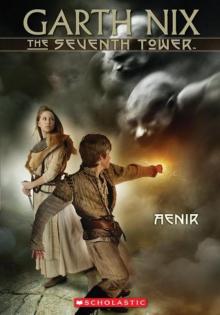 Aenir
Aenir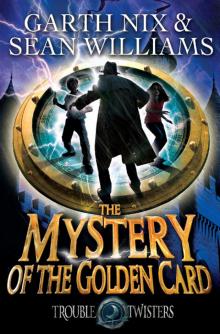 Mystery of the Golden Card
Mystery of the Golden Card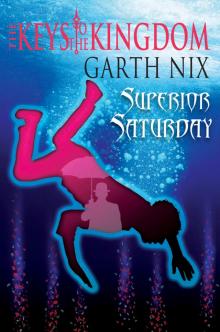 Superior Saturday
Superior Saturday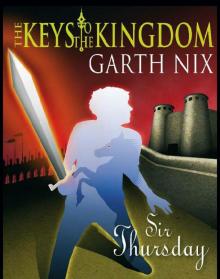 Sir Thursday
Sir Thursday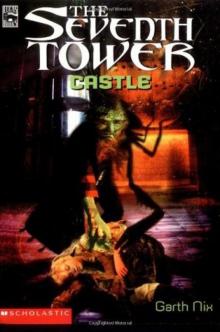 Castle
Castle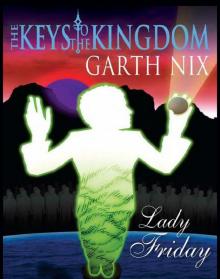 Lady Friday
Lady Friday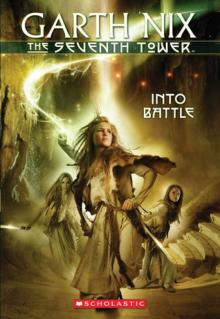 Into Battle
Into Battle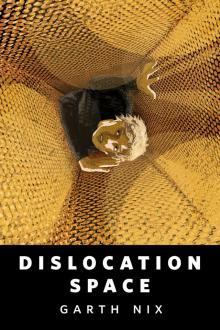 Dislocation Space
Dislocation Space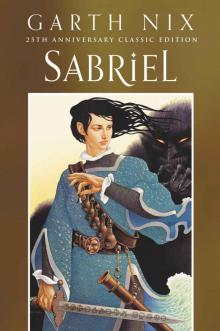 Sabriel (Old Kingdom Book 1)
Sabriel (Old Kingdom Book 1) Sir Hereward and Mister Fitz Go to War Again shamf-1
Sir Hereward and Mister Fitz Go to War Again shamf-1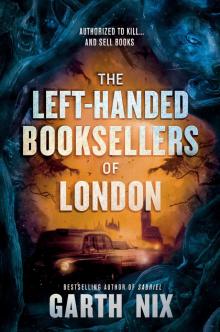 The Left-Handed Booksellers of London
The Left-Handed Booksellers of London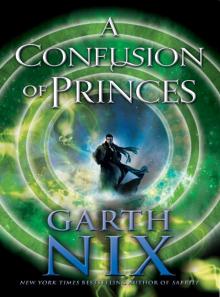 Novel - A Confusion of Princes
Novel - A Confusion of Princes One Beastly Beast
One Beastly Beast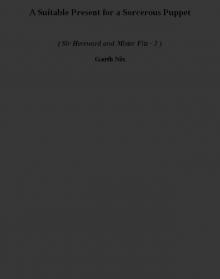 A Suitable Present for a Sorcerous Puppet shamf-3
A Suitable Present for a Sorcerous Puppet shamf-3 Beyond the Sea Gates of the Scholar Pirates of Sarsköe shamf-2
Beyond the Sea Gates of the Scholar Pirates of Sarsköe shamf-2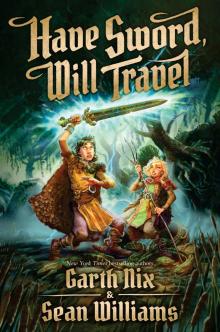 Have Sword, Will Travel
Have Sword, Will Travel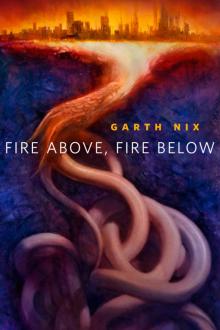 Fire Above, Fire Below
Fire Above, Fire Below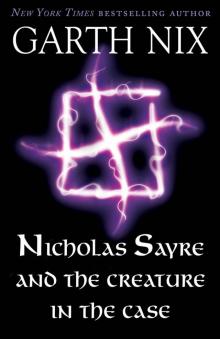 Nicholas Sayre and the Creature in the Case
Nicholas Sayre and the Creature in the Case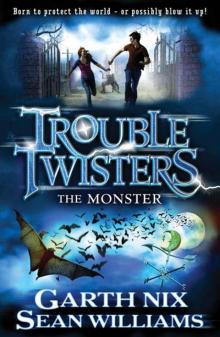 The Monster (Troubletwisters)
The Monster (Troubletwisters)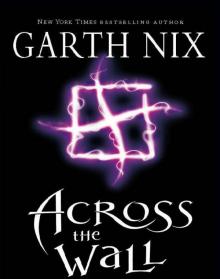 Across the Wall
Across the Wall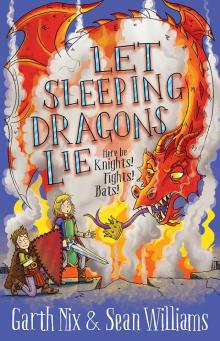 Let Sleeping Dragons Lie
Let Sleeping Dragons Lie![[Abhorsen 03a] - Across the Wall Read online](http://i1.bookreadfree.com/i2/04/12/abhorsen_03a_-_across_the_wall_preview.jpg) [Abhorsen 03a] - Across the Wall
[Abhorsen 03a] - Across the Wall